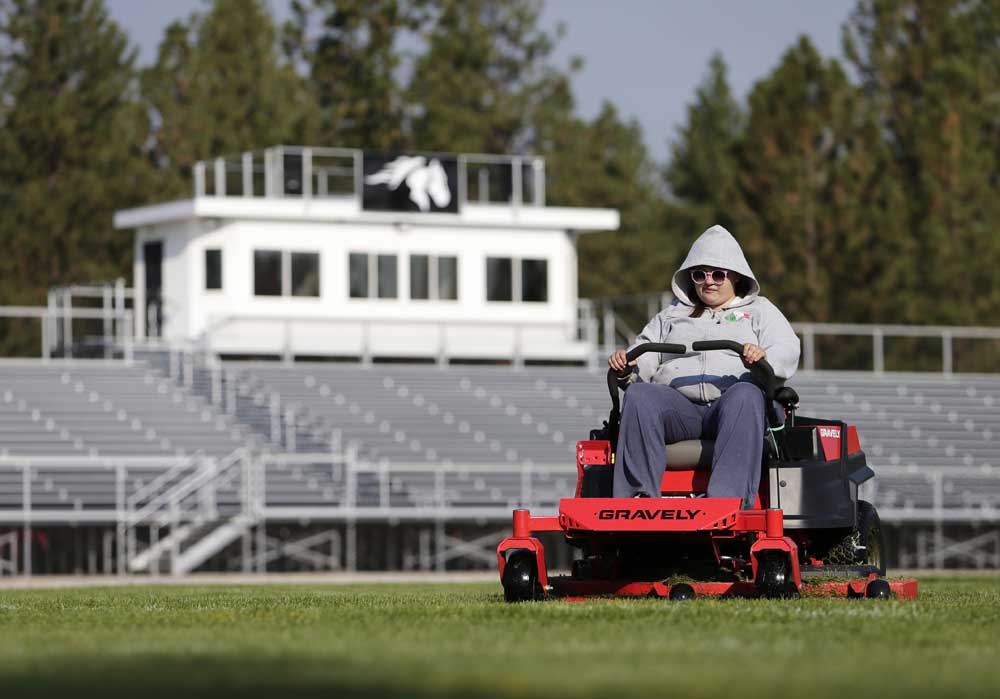Transition Program helps special-education students enter workforce
Published 12:00 am Thursday, August 30, 2018

- Emma Solem mows the Sisters High School football field grass on Wednesday. Solem is in the Transition Program, which helps with job training and life skills, for special-education students in the Sisters School District. (Joe Kline/Bulletin photo)
SISTERS —
The student workers at the Sisters High School football stadium have honed their landscaping skills by carefully grooming the grounds for the Outlaws’ opening game Friday night. But for these special-education students, the school district paycheck is only half the reward.
The real incentive here is learning what it takes to keep a job in the community, according to the Sisters School District’s Transition Program, which helps developmentally disabled students aged 18-21 learn work skills. They initially tackle minimum-wage jobs for the district, then eventually work for local companies.
“By working landscaping (or) doing custodial work, they learn all the soft skills that come with employment: how to show up, how to work hard, how to stay on task,” said Dan Saraceno, youth transition specialist. “The real goal, as they learn those soft skills and learn those employment skills, is to transition them into the community in order to find competitive employment in our community.”
According to Josh Nordell, who leads the Transition Program, the school district began hiring special-education students last school year. Although the students begin at schools, they eventually work at various local businesses like Ray’s Food Place, Ace Hardware and Black Butte Ranch. Students have even worked at Sisters City Hall, Nordell said.
“We’re trying to get into every business we possibly can,” he said.
Nordell and Saraceno said the students begin their job, whether it’s with the district or at a business, with a job coach who leads the students and keeps the employer happy. These coaches have different tasks, depending on the capability of the students they’re paired with.
For example, job coach Bryn Singleton works with Michaela Madsen at Sisters Athletic Club as she performs custodial tasks.
Because Madsen is “somewhat verbal,” she had to simply watch Singleton perform tasks for a while before being able to join along, the job coach said.
Now, Madsen has nailed down her routine and she’s strengthening her social abilities, Singleton said.
“The Athletic Club is really good for (Madsen) because in her typical day, when she’s been in school, she knows everybody,” she said. “People at the club interact with her all the time, and she doesn’t always talk back, but it’s good for her to build those skills too.”
Transition currently has about 10 to 12 students — the numbers fluctuate frequently, Nordell said — and some students with less extreme developmental disabilities work without job coaches or are enrolled full-time at Central Oregon Community College. The program helps these students obtain a job and can troubleshoot if the students have any difficulties, according to Nordell.
The goal for all students in the program is to shift them from working school district jobs into other careers in the community, and some students do both at the same time. For example, landscapers Max Huni and Brian Groat have second jobs at Best Buy and Ray’s Food Place, respectively.
According to Nordell, the job program has been an immediate success.
“There’s been a couple of surprises as we’ve done this: (One) is how fast the skills have developed and how much more independent every student’s gotten,” he said. “The second … is how good of a job that they’ve done. The work that they’re doing is really at a high level at this point.”
Mark Stewart, the director of special programs for Sisters School District, said Transition has been “highly successful for us.”
“Instead of when (the students) turn 18, just sending them out and wishing them luck, we have a three-year period … to give them skills and give them support,” he said. “I have to give our district and our superintendent a lot of credit for buying into this program, because a lot of other districts are very hesitant about hiring students … for competitive employment in their districts.”
Rebecca Womack, who works with Transition students at Sisters Athletic Club, said her organization has hired multiple Transition or other developmentally disabled employees. One is a former Transition student who graduated last school year, and the club has kept him around due to his strong work skills.
“I think the members have been impressed with a lot of the kids and what they’re doing and how they take their jobs seriously as well,” she said. “I feel like it’s a win-win.”
— Reporter: 541-617-7854;jhogan@bendbulletin.com








